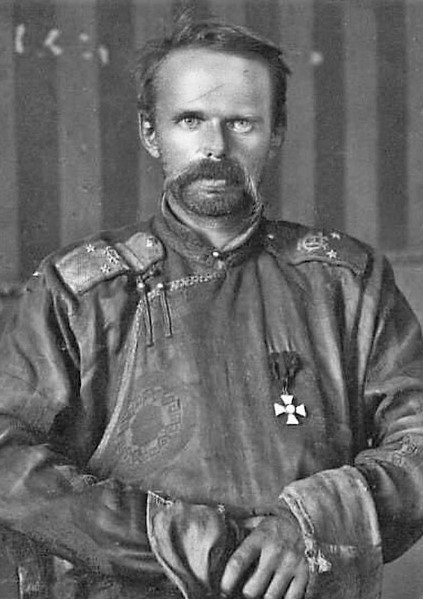mNo edit summary Tag: Visual edit |
(Death) Tag: Visual edit |
||
| Line 8: | Line 8: | ||
== Invasion of Mongolia == | == Invasion of Mongolia == | ||
Ungern invaded Mongolia in October 1920, gaining the support of the Mongolian nobility against [[Republic of China|China]], and created a pro-[[Empire of Japan (1868–1947)|Japanese]] provisional government led by the nobles Luvsantseven and Zhamyan. He then allied with the [[Agvaan Luvsan Choijinnyam Danzan Vanchüg|Bogd Khan]] and defeated the Zhili clique in February 1921. He ruthlessly exploited the Mongolian peasants but did not take from the nobility. Ungern executed the Minister for the Western Province and removed the War Minister from office.<ref name=":03" /><sup>:283–5</sup> | Ungern invaded Mongolia in October 1920, gaining the support of the Mongolian nobility against [[Republic of China|China]], and created a pro-[[Empire of Japan (1868–1947)|Japanese]] provisional government led by the nobles Luvsantseven and Zhamyan. He then allied with the [[Agvaan Luvsan Choijinnyam Danzan Vanchüg|Bogd Khan]] and defeated the Zhili clique in February 1921. He ruthlessly exploited the Mongolian peasants but did not take from the nobility. Ungern executed the Minister for the Western Province and removed the War Minister from office.<ref name=":03" /><sup>:283–5</sup> | ||
Along with General [[Boris Rezukhin|Rezukhin]], Ungern battled the [[Mongolian People's Army|Mongolian People's Revolutionary Army]] in July 1921. They fled into Russia on 24 July and fled back into Mongolia after the Red Army defeated them at Lake Gusinoye on 5 August. Ungern's own Mongolian troops disarmed him when he tried to advance into western Mongolia. The 35th Cavalry Regiment captured him and took him to Novosibirsk, where he was sentenced to death and executed.<ref name=":032">{{Citation|author=A. A. Guber, et al.|year=1973|title=History of the Mongolian People's Republic|title-url=https://archive.org/details/HistoryOfTheMPR/page/n116/mode/1up|chapter=The Mongolian People's Revolution and the Proclamation of the Mongolian People's Republic|page=}}</ref><sup>:300–1</sup> | |||
== References == | == References == | ||
Latest revision as of 18:12, 3 June 2024
Roman Ungern-Sternberg | |
|---|---|
 | |
| Born | 10 January 1886 Graz, Austria-Hungary |
| Died | 15 September 1921 Novonikolayevsk, RSFSR |
| Cause of death | Execution |
| Nationality | German |
| Political orientation | Absolute monarchism |
Nikolai Robert Maximilian Ungern-Sternberg (10 January 1886 – 15 September 1921), also known as Roman Ungern-Sternberg, was a German aristocrat and counterrevolutionary general in Russia and Mongolia during the Russian Civil War.
Russian Civil War
Ungern's forces fled into Manchuria and Mongolia after the Red Army defeated them in Siberia.[1]:283
Invasion of Mongolia
Ungern invaded Mongolia in October 1920, gaining the support of the Mongolian nobility against China, and created a pro-Japanese provisional government led by the nobles Luvsantseven and Zhamyan. He then allied with the Bogd Khan and defeated the Zhili clique in February 1921. He ruthlessly exploited the Mongolian peasants but did not take from the nobility. Ungern executed the Minister for the Western Province and removed the War Minister from office.[1]:283–5
Along with General Rezukhin, Ungern battled the Mongolian People's Revolutionary Army in July 1921. They fled into Russia on 24 July and fled back into Mongolia after the Red Army defeated them at Lake Gusinoye on 5 August. Ungern's own Mongolian troops disarmed him when he tried to advance into western Mongolia. The 35th Cavalry Regiment captured him and took him to Novosibirsk, where he was sentenced to death and executed.[2]:300–1
References
- ↑ 1.0 1.1 A. A. Guber, et al. (1973). History of the Mongolian People's Republic: 'The Mongolian People's Revolution and the Proclamation of the Mongolian People's Republic'.
- ↑ A. A. Guber, et al. (1973). History of the Mongolian People's Republic: 'The Mongolian People's Revolution and the Proclamation of the Mongolian People's Republic'.